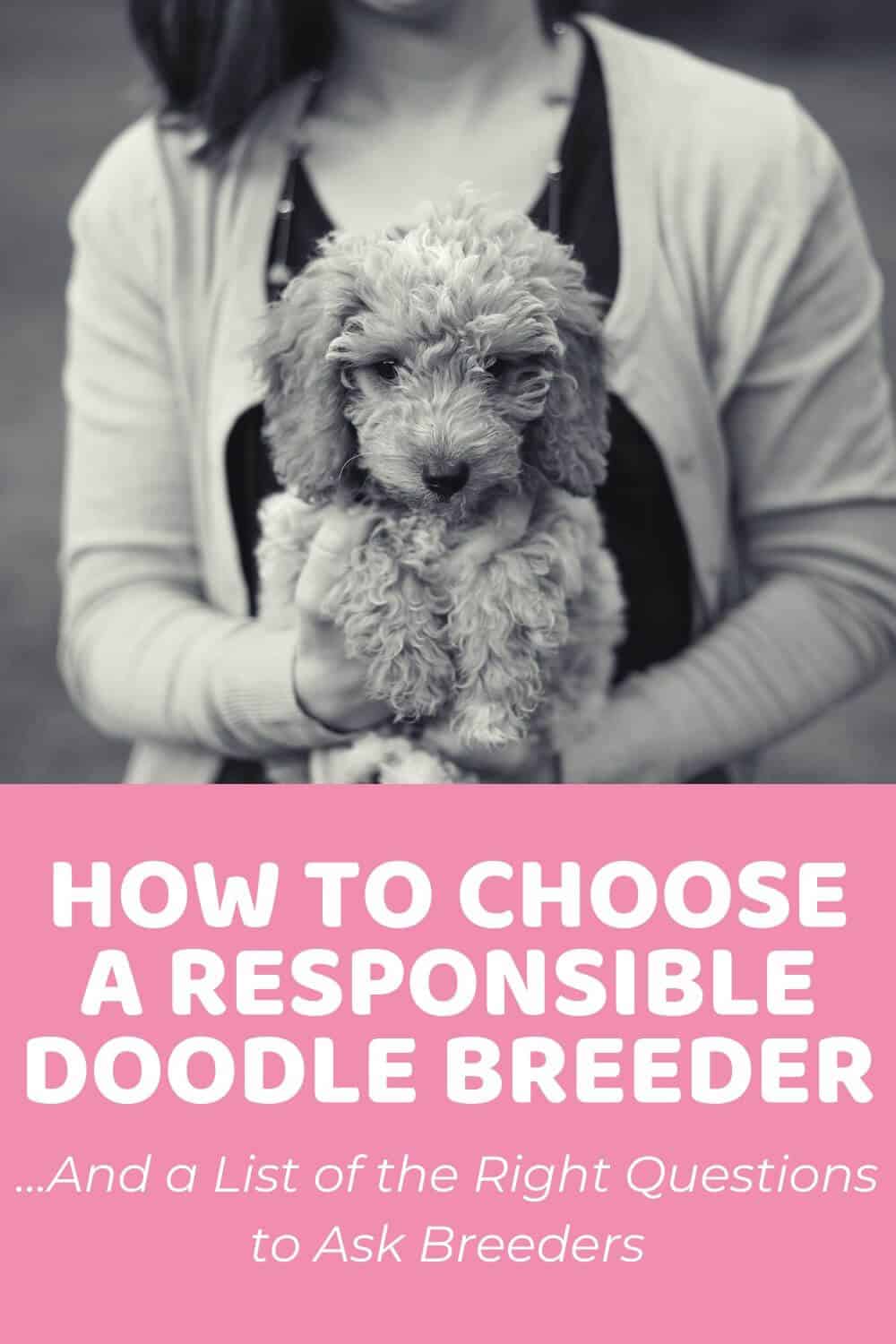Bernedoodles are much in demand for their low-shed, multicolored coats and sweet, even-tempered personalities. They make truly excellent family dogs. However, if you are looking to get one of these Bernese Mountain Dog-Poodle crosses, you might have a few questions about what to expect from your newest family member.
While aspects such as potential size, likely temperament, as well as exercise and maintenance needs will all be playing on your mind, one of the most crucial concerns any potential pet parent will have is how much adopting one of these dogs will set them back.
Bernedoodle puppies typically run to somewhere between $2,000 to $5,000 at present. This is quite a bit more than some other Doodle Doods and is primarily due to an increase in demand for these darling dogs. Where precisely a specific puppy sits between those two figures will depend on a number of factors, as we will cover in this article.
Bernedoodle Price Comparison Across Popular States
| State | Price | Breeder |
| California | $2,800 – $4,200 | Bernedoodles And Co |
| Florida | $3,500 | Central Florida Bernedoodles |
| N.Carolina | $2,900 | Darlin’ Doggies |
| N.England | $3,000 | Harmony Hill Doodles |
| New York | $5,000 | Point Breeze Doodles |
| Texas | $4,000 – $4,500 | Sweet Pea Bernedoodles |
Table of Contents
- Factors that Determine Bernedoodle Puppy Price
- Different Types of Bernedoodle Breeders and How Price Varies
- Bernedoodle Costs of Ownership
- Where Can you Buy a Bernedoodle?
- Adopting a Bernedoodle
- Frequently Asked Questions on Bernedoodles
- Bernedoodle Price Final Thoughts
Factors that Determine Bernedoodle Puppy Price
The ‘designer dog’ price tag of Bernedoodles (much like other Doodles) already sets them ahead of the curve. However, when shelling out for any dog, you want to be sure you’re getting what you pay for – a happy and healthy pup. With that in mind you’ll need to pay close attention to the following:
Genetic Guarantees
The great thing about purchasing a more established breed, such as a pedigree dog, is that there are certain standards that the breeding facility must ensure that they live up to. This covers everything from healthy, officially-registered parents to thorough genetic health testing. While Doodles are obviously not pedigree pups, the best breeders will still work towards the same kinds of standards.
Another way to identify a higher-quality breeder is that they will offer something known as a health guarantee with purchase. This document basically states that the breeder is confident that the puppy is free from any heritable diseases. If any do arise within a certain period (usually two years), they will take the puppy back and return your money. In this case, you know you are getting a good one, but these dogs obviously won’t be on the cheaper end of the scale.
Location
With Bernedoodles fast becoming firm favorites with the Doodle-fan tribe, more and more breeders are specializing in these gorgeous dogs. This makes it easier than ever to get hold of puppies – even in your neck of the woods. However, suppose you live in an expensive neck of the woods, such as in the city compared with the country. Costs are likely to be much higher. You may consider venturing further afield simply because the dogs there might be a little cheaper.
If this is the case for you, don’t forget to factor in transport expenses. If you are able to pick your puppy up – great! But if you do want the facility to ship them to you, this could end up costing you some serious dough. You’ll have to cover flight tickets (if you are looking to have them flown in) for the dog as well as an in-flight cabin nanny (two ways for the latter, of course). Plus, there may be additional costs like quarantine fees to consider. All-in-all, it could end up making the puppy even more expensive than the ones from the more local breeder would be.
Breeder Stock
These days, the best breeding animals certainly don’t come cheap, and that’s the case whether the dogs are pedigree or Doodle. In the case of first-generation (or backcross) puppies, the parent dogs are going to need to be AKC or CKC registered Bernese Mountain Dogs or Poodles. Such animals could cost between $750 and $3,000 (you’ll notice that Bernedoodles are often more expensive than their pedigree parent breeds).
Those breeding later generation dogs will need health tested Bernedoodles fit for breeding. These kinds of pups aren’t always easy to come by as many breeders put a neuter condition into the purchasing contract. The idea being to protect both the health of the dog and the general Bernedoodle breeding standards. Finally, all breeding animals will need to be extensively tested for any evidence of genetic diseases. This is something else that definitely doesn’t come cheap!
Demand
As we well know by now, when something becomes first popular and then scarce, the price can really shoot up. Luckily, a multitude of breeders these days specialize in the super Bernie, meaning that it isn’t all that hard to get hold of quality puppies at more reasonable prices. However, that won’t necessarily be the case the country over. So location will again come into play here.
Another important aspect of supply and demand will be the type of Bernedoodle you are after. First-generation dogs may very well be more widely available than later-generation ones for cost reasons. However, backcrossed dogs may be more desirable due to their higher likelihood of having a low-shed, so-called hypoallergenic coat. This is where you might need to make a few compromises between what you want vs. what you can afford.
Size
The size of the dogs can also have a significant effect on their cost for two main reasons. Firstly, while larger dogs may be more common, smaller ones are generally more desirable for many. This is often just due to how much more convenient it is to have an ity-bity rather than a larger pup about the house and how much easier people presume they are to handle. This will obviously up the price tag for littler Bernies.
Also, more work goes into breeding diminutive pups from larger parents while keeping them healthy. This takes a great deal more experience and expertise from the breeder and will also be reflected in the cost.
Be very cautious, though, about facilities offering teacup-sized Doods – especially ones from much larger parents such as the Bernese Mountain Dogs. Breeding pups this small could have all kinds of consequences for their health.
Coat Color
Aside from coat type (as covered above), strangely, coat color can also significantly impact the cost of a Bernedoodle – as with any other Doodle. Generally speaking, the more colors to be found in their coat, the higher you can expect the price to be. Bernies typically have three distinct shades – black, white, and tan. This already places them in the higher price category.
Aside from this, you may also be expected to pay more for Bernedoodles with rarer coat colors than their more regular counterparts. These include red and white, sable, phantom, and merle, among others. Bernies can inherit these, and even more colors besides, from their Poodle parents, who come in a veritable rainbow of hues. This is especially the case with puppies with a higher concentration of Poodle genes.
Breeder Reputation
Finally, with so many scam artists, puppy mills, and bad breeders around (which we will take a look at in a minute), ones that have established a solid reputation in the Doodle community can just about name their price for their puppies. As this takes a lot of years and even more hard work, that’s probably fair enough. You know that you can trust the dogs that come from these places, not just to be happy and healthy but to have excellent temperaments too.
Established breeders, with all their expertise, are usually also able to offer potential buyers a whole host of other puppy-related services too. They may have training schools, usually provide early sensory stimulation and socialization, and often can give tons of guidance for handling a new fur baby. These kinds of services are invaluable, especially for newbie owners who might not know quite what to expect from their puppy.
Different Types of Bernedoodle Breeders and How Price Varies
Mostly so far, we’ve been talking as if all Bernedoodle breeders are totally great. Wouldn’t it be wonderful if this were, in fact, the case? Sadly though, bad ones are out there too. One of the biggest indicators that you aren’t dealing with the best kind of facility is that the puppies are quoted as being far cheaper than from other places.
While you may jump at the chance for a bargain, and we wouldn’t blame you for that – Doodles are fairly costly hounds, after all; you could very well end up paying a much higher price for doing so in the very near future when all kinds of health and behavioral issues rear their ugly head.
The three main types of breeding facilities you may come across out there are:
Professional Breeders
These are the good guys. The ones with not only the desire to improve the Bernedoodle line by breeding only the best puppies but also with the know-how to do it. They invest a great deal of money in their animals, who are loved, nurtured, and well cared for, and it clearly shows. You can usually spot these sorts of breeders from their online presence, including comprehensive business websites with plenty of details about the dogs.
Backyard Breeders
These are the not-quite-so-bad guys. Backyard breeders tend to be regular pet owners who decide to make a quick buck through a spot of amateur breeding. Usually, these folks love their pets and treat them well, but they don’t have much of an idea of how to breed them safely and correctly to ensure the healthiest of pups. They likely don’t have a lot of knowledge on puppy rearing either. These dogs will be cheaper and of a lower quality.
Puppy Mills
These are definitely the bad guys. Unlike backyard breeders, puppy mills are large-scale operations that are absolutely focused on profit above all else. The parent pups aren’t vetted and bred as often as possible. The facilities will be totally basic – cramped and dirty, and the food will be the cheapest possible option. Puppies from here will undoubtedly be the least expensive, but they will likely have all kinds of health and behavioral issues when you adopt them.
Bernedoodle Costs of Ownership
Once you have got to grips with the initial price of getting a Bernedoodle, then it’s time to think about the ongoing expenses of dog ownership. These can be quite a shock if you aren’t prepared for them. It is estimated that the lifetime cost of a dog could be as much as $20,000. So this is certainly something to factor into your decision.
The most significant costs include, but are not limited to:
Food and Treats
While there are many options when it comes to food for your pup, you can’t just pick any old thing up off the shelf. As with people’s food, the better stuff will cost a bit more but is necessary to promote and preserve your pet’s health. These are our top picks for Bernedoodles.
Obviously, the larger your dog, the more you will be looking at. You might expect to fork out somewhere in the region of $300 to $500 a year for kibble, more for wet food. Treats can be done a little more cheaply if you opt for leftover fruits and veggies, for instance. These are a great choice as Bernie’s can quickly pile on the pounds with more calorie-rich options.
Training and Boarding
If you have the knowledge to handle all training and socialization yourself at home, you’ll likely save yourself a bundle to start with. Professional classes can be a little costly. However, these may be more necessary for newbie owners who are not so familiar with how to handle super smart or larger pups, such as the Bernedoodle.
Boarding is something you will also need to think about if you are planning on taking any vacations abroad. Taking your pal along on-at-home trips may be fun, but it will likely be too stressful to get them on a plane. Depending on the facility you opt for, this could cost around $100 to $150 per night.
Vet Visits
While purchasing your pet from a professional will help keep vet check costs down quite significantly, they are still something to factor in. Regular checkups can help you stay on top of your pet’s health because early signs of an issue can be spotted and dealt with more quickly and efficiently. The average price of a checkup is around $50.
Naturally, you can count on vet expenses being bigger at the start when you’re dealing with vaccinations and increasing as your pet ages too. More problems start developing as your pup gets on in years. For instance, a common issue among larger dogs such as the Standard Bernedoodle is hip dysplasia.
Grooming
The exact amount you will need to spend on professional grooming will vary depending on which coat type your Bernie has (curly coats will be more costly), their size, and how much time you spend brushing and bathing them yourself. You’ll likely be facing upwards of $100 a session and 4 to 6 sessions a year.
There is no reason at all, though, that you shouldn’t be able to care for your pet’s coat yourself in the comfort of your own home (time allowing, of course). We want to help. That’s why we’ve created a whole host of handy grooming guides that cover everything from the best brushes for the job to how to clip their coat – and everything in between.
Other Costs
As well as these, they are a bunch of other expenses, some ongoing and others one-offs. This includes getting the right accessories – dog bed, crate, collar, leash, grooming tools, shampoo and conditioner, toys, chews, and more. For a decent quality crate and dog bed, you might be looking at $50 to $60. Treats and toys could set you back an additional $200.
For a comprehensive list of everything you might need for your new puppy, check out our dedicated article.
Where Can you Buy a Bernedoodle?
When you start searching for Bernedoodle puppies, you’ll likely be inundated with options. Narrowing these down will be the hard part. Don’t get distracted by flashy websites and cute photos. Look for the vital details to ensure you don’t get ripped off or fall foul of a puppy mill.
A good place to begin is with recommendations from trusted sources such as family and friends or expert websites. At Doodle Doods, we have compiled our own Breeder’s Directory and State-based recommendations of our most trusted facilities. Just make sure to carefully vet the details. This article on How To Choose A Responsible Breeder will come in handy for this.
Adopting a Bernedoodle
An alternative and admittedly much cheaper option is to try and track down a Bernedoodle at a shelter or rescue center. You will need to pay an adoption fee if you do, but it will obviously be far less than purchasing a puppy from a breeder. However, it’s pretty unlikely that you will find one of these popular pooches in this situation. Most people who shell out this kind of cash on a dog are in it for keeps.
Another factor to consider when it comes to adoption is that you are unlikely to be able to find out much about the dog in question’s history. This means that you won’t know their chances of succumbing to a genetic illness or how they have been treated in the past. You’ll need to get them thoroughly vet checked and be careful with how you are around them until you can be more sure of their temperament.
Frequently Asked Questions on Bernedoodles
Bernedoodles can be on the expensive side, but there are a few ways you could get one of these charming pups a little cheaper. The most obvious one is to opt for a lower-quality breeder, but we don’t recommend this route – not one bit. Everything you save in the initial price will likely be eaten up in trainer and vet bills. Instead, consider going for a larger, first-generation dog and shop around a little to see if any facilities outside of the city have a better deal on these darling dogs.
Despite, or rather due to, their smaller size, Mini Bernedoodles can often be much higher in price than their larger counterparts. This is because of the demand for more toy-sized hounds coupled with the fact that these pups are much harder to breed. If you would prefer a Mini Bernie, you will likely be looking at somewhere between $3,500 and $5,000. Although, naturally, some of this expense will be offset later by the fact that these guys require less food and smaller accessories.
Bernedoodle Price Final Thoughts
If you’re in the market for a shining new Bernedoodle, you might be concerned with how much these dogs cost. It’s true – they certainly don’t come cheap. You will have to think about much more than the initial price tag and will likely have to put aside a good amount each year to cover food and other expenses. However, the upside to paying a bit more for a puppy is that not only are you guaranteed a healthy, cute chappy, but through supporting professional breeders, you are upholding the health of all future Bernedoodles. The ongoing costs you might just think of as a slight tax on the joy your new family member will undoubtedly bring you every day they are by your side.
Learn How to Care for Your Doodle Puppy!

Perfect for first-time Doodle parents, get ALL your questions answered, including questions new Doodle parents don’t even think to ask.
Plus, get $700 worth of Bonus Materials for FREE, including:- Doodle Parenthood Community and Support Group ($190 value)
- Doodle Puppy Growth Tracker ($20 value)
- EMERGENCY Cheatsheet: When To Call The Vet Immediately ($50 value)
- HELP! Button ($145 value)
- And SO MUCH MORE!












